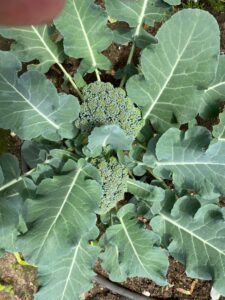Photo credit: Rabbi Susan Elkodsi, 2021
One of my first classes in rabbinical school at AJR was “Contemplative Practice” with Rabbi Jill Hammer. One of the assignments had to do with “mindful eating,” where you take a small food item–perhaps a grape or raisin– look at it, touch it, squeeze it, smell it, recite a blessing… you get the picture. Finally, you eat it.
I happened to be mindlessly nibbling on a chocolate Krispy Kreme donut while doing this assignment, so I decided to try it. I broke off a piece of the donut and followed the procedure. When I finally tasted it, ugh! I felt as though I was eating fried chocolate Crisco. Some people would have tossed the rest of the donut, but not me. I finished it.
This week’s Torah portion, Eikev, can be seen as a lesson in mindfulness. Moses is continually telling the people to listen, to be mindful, of all that the Holy One of Blessing has done for them; bringing them out of Egypt, not destroying them in the wilderness, providing sustenance, and ensuring that their clothing didn’t wear out and their feet didn’t swell. (Dev. 8:4)
We’re also reminded that once we’re settled in the Promised Land, and are successfully living off of it, not to get too haughty and think it’s all because of our own efforts, to “remember that it is Adonai your God who gives you the power to get wealth, in fulfillment of the covenant made on oath with your ancestors, as is still the case.” (see Dev. 8:12-18)
Moses isn’t just admonishing the people regarding giving credit where credit is due, he’s reminding them that they’ve made it this far due to the merit of Abraham, Isaac and Jacob, not because they themselves merited it.
Blessings work both ways; God blesses us, and we bless God by showing gratitude and praise, and sometimes, even anger and frustration. You’ve seen the line, “Beer/Chocolate/Coffee is proof that God loves us and wants us to be happy.” After all, if that weren’t the case, manna would have tasted like liver (apologies to those who actually like it). Instead, it tasted like what we wanted it to taste like.
I haven’t found a way to make broccoli taste like chocolate chip cookies, but someone, somewhere is working on it. What I have found is a connection in Eikev to the concept of mindful eating. Chapter 8, verse 10 reads, V’achalta, v’savata u vay-ra khta et Adonai Elohekha…” “And you will eat, and you will be satisfied, and you will bless the Lord your God for the good land that God has given you.”
Blessing our food, before and after eating, helps us to stop and think about what we’re eating; the hands that prepared it, the many people who were involved from growing the raw ingredients to the ultimate processing, to getting it to us. And of course, to the Creator, the One who causes the wind to blow and the rains to fall in their proper season.
May the food we eat nourish us body and soul, may our orchards, gardens and fields be blessed on the land that God has given us.











0 Comments